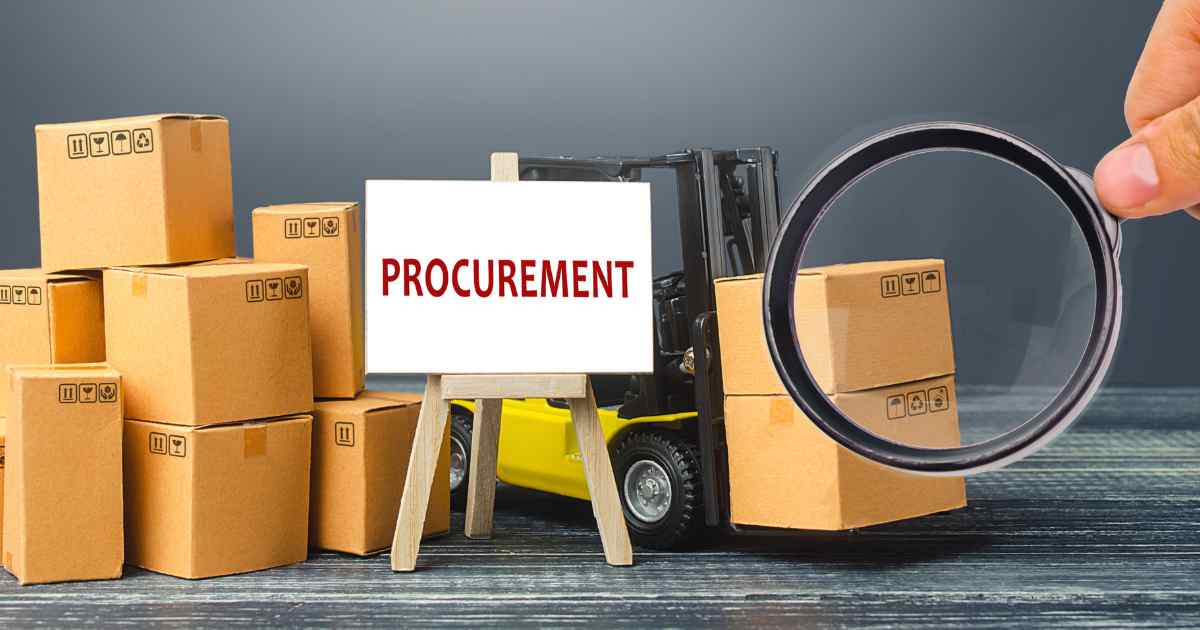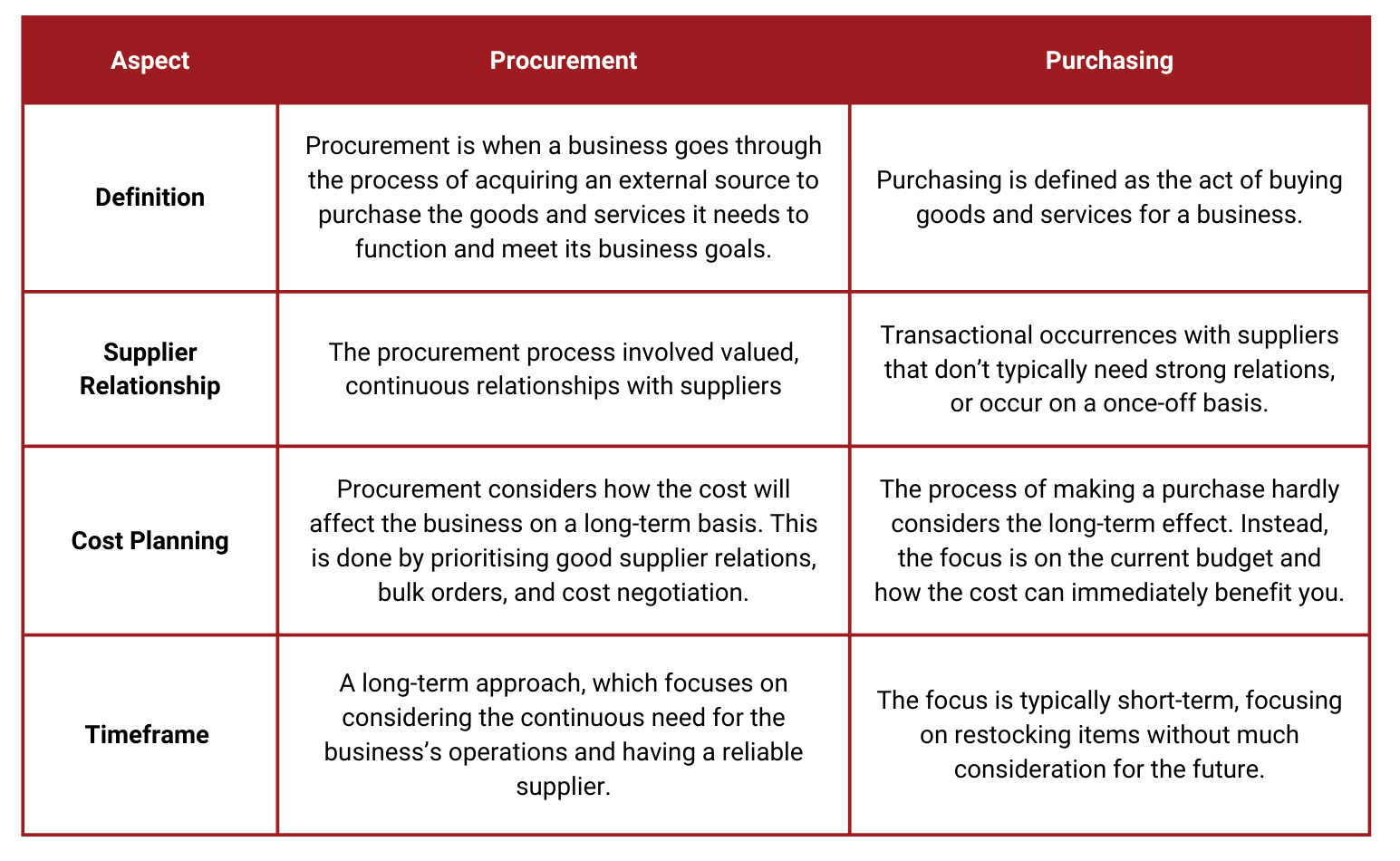
If you are new to entrepreneurship, entering a new role, or just merely curious, you might have come across the term procurement and wondered what it is. Wonder no longer as you answer your burning questions.
Procurement is a necessary part of any business, and in this article, we’ll tell you all the basics you need to know about procurement. From what it means, to the different types of procurement, and how to build a great procurement strategy.
What is It?
Procurement is when a business acquires the goods and services it needs to function and meet its business goals. This includes everything from consumables such as office supplies to other goods like car parts – inventory – for fixing cars if you’re an auto repair shop.
Different Types of Procurement
There are two main types of procurement, which are direct and indirect procurement. These are distinguished based on how they affect business operations – directly, or indirectly. Let’s say you run a hair salon. Your direct procurement items would be items like hair dryers, straighteners, wigs, hair relaxers, etc. On the other hand, your indirect procurement items can include cleaning supplies to keep the salon clean.
Procurement isn’t just about goods, there are services too. To continue with the example of a hair salon business, the procurement services for a salon could include anything from waste and disposal services to outsourced marketing services and digital tools for inventory management.
What is E-Procurement?
The use of digital technologies in your business falls under the umbrella of e-procurement. Electronic procurement (e-procurement) is when a business digitises the acquisition process of goods and services.
E-procurement is also known as supplier exchange because it encourages a business-to-business relationship through a closed system where only registered users can make or receive orders.
What is the Difference Between Procurement and Purchasing?
It’s easy to assume that procurement and purchasing are the same thing. There are similarities, however, the difference between these two processes are clear.

What Are the Benefits of Procurement?
Having a solid strategy can have a positive effect on your business. Apart from improving the functionality of your business, other benefits include:
Win-Win for Business and Supplier: Your relationship with your supplier is likely to benefit both of you in the long run. Whether it’s through negotiated costs or long-term agreements, both parties get to benefit.
Availability of Resources: With a solid procurement strategy, your business gets to enjoy having access to the resources required to fulfil tasks.
Control Over the Flow of Company Goods and Services: When you are intentional and thoughtful in the planning of your procurement process – through risk management and compliance, automation, and ensuring you optimise your process to suit your business needs, you get to enjoy being in control of your business’s procurement.
What Are the Disadvantages of Procurement?
There are some risks associated with if your procurement strategy isn’t solid. Additionally, sometimes mishaps occur. The disadvantages are:
Unreliable Suppliers: Having an unreliable supplier will have a negative impact on the business operations. Whether they delay deliveries or do not consistently deliver quality goods, the ripple effect it could have on a business isn’t worth it. Thus, it’s important to go through the necessary steps to vet your suppliers.
Human Oversight: When working with human beings, there will unfortunately always be room for error. This can lead to incorrect invoices, delayed orders, and the overall inconvenience of needing to correct those errors. The best way to avoid such errors is to adapt and automate your processes wherever possible.
Supply Chain Delays: Businesses always have to prepare for supply chain delays. At times, the logistics and transportation sector may face challenges that may be out of your or the supplier’s control, and your business will feel the brunt of it if it has not planned for such delays.
How to Build an Effective Strategy?
- Assess your business’s procurement needs and set clear goals.
Ask yourself what’s missing from your current strategy, and how it can be improved. - Define clear guidelines on how procurement should be handled in each department.
This could include how employees should request purchases and who to make these requests to. - Have criteria for the suppliers you need and verify them accordingly.
These criteria can include values that align with your business, reliability, cost, as well as delivery times. - Implement e-procurement and automation.
It is fundamental to be adaptable for any business that desires to future-proof itself. Moving from manual to automated systems also saves time and costs in the long run. - Conduct training for procurement software.
You want to reduce the element of human error, so it’s best to ensure your team responsible for procurement knows how to use any software you integrate into your business. - Oversee your process and implement changes (when necessary).
Once you’ve implemented a new strategy, you need to monitor and evaluate how it’s working for your business. Always leave room for improvement where necessary.
Now that you have all the essential information you need to implement your best strategy, you can find out more about implementing inventory management software into your business.
You can also come join us at the 2025 SME SA Funding Summit! Get your tickets on the SME South Africa Event page.






